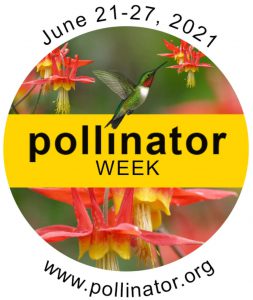 Calling all gardeners (and all who want to be gardeners)! Would you like to learn how to help our natural environment and add beauty to your yard? Join in this year’s annual international celebration of Pollinator Week! This event brings to the forefront the importance of our native pollinators (including bees, butterflies, birds, moths and others), along with loads of information on ways to support and increase their diminishing populations. Learn how you, too, can experience the joy of maintaining a pollinator garden!
Calling all gardeners (and all who want to be gardeners)! Would you like to learn how to help our natural environment and add beauty to your yard? Join in this year’s annual international celebration of Pollinator Week! This event brings to the forefront the importance of our native pollinators (including bees, butterflies, birds, moths and others), along with loads of information on ways to support and increase their diminishing populations. Learn how you, too, can experience the joy of maintaining a pollinator garden!
New gardening trends support our pollinators
A large and growing trend in gardening for pollinators is the establishment of wildlife “green” corridors, in which cities and towns combine individual garden spaces that support pollinators. If you plant pollinator plants in your yard, and your neighbor does the same, followed by another neighbor, you – together – have created a “green” corridor that supports our native pollinators. As businesses, institutions and municipalities join in this movement, an entire city or town will benefit our pollinators, and at the same time create a community of diverse and beautiful landscapes.
Pollinator gardens are easy to establish and can be maintained at any size desired. In small yards a pollinator garden might consist of cheerful wildflowers. Larger landscapes can attract pollinators with trees and shrubs as well as a diversity of flowering perennials and annuals. Even apartment and condominium dwellers can plant patio gardens with containers of beautiful flowers that attract pollinators.
Gardening for pollinators, as well as other small wildlife, may be a relatively new trend for many gardeners. If you are new to the concept of pollinator gardening, spend a bit of time familiarizing yourself with the basic elements of pollinator gardening. (See list of sources below.) Talk to others about their experiences with pollinator gardening. You might seek information from other gardeners, staff members of native nurseries, and your UF/IFAS Extension Polk County Master Gardener Volunteers.
Some tips on pollinator gardening
- Plant in masses of the same color. When starting a new garden it is a good idea to plant multiple plants of similar color as opposed to one each of several colors.
- Plant Florida native plants as much as possible to support our native pollinators. Purchase native plants from reliable nurseries that specialize in native plant varieties.
- Include a diversity of plant types to increase the variety of visiting pollinators, for example:
plants of varying heights and those whose flowers have varying sizes and shapes (e.g., flowers that are daisy-shaped, tubular, clustered, etc.) - Plants that bloom in different seasons of the year.
- Avoid hybridized flowers, especially “double” flowers.
- Avoid the use of pesticides in or near garden areas.
- If you wish to support butterflies in your garden, include butterfly host plants.
- Provide a shallow source of water – clean frequently!
- Provide open sandy areas for ground-nesters. Supply small twig piles for insect homes. During the winter, leave an area of fallen leaves unraked, and leave hollow plant stems untrimmed for overwintering insects.
- For winter interest, incorporate evergreen plants in your design.
Finally, enjoy your pollinator garden! Create a garden filled with beautiful flowers and enjoy the lively antics of bees, birds, butterflies and other insects in your “living” landscape. Join the growing number of gardeners who have found a renewed enthusiasm in gardening – for pollinators!
To learn more
Attracting Native Bees to Your Florida Landscape
This article was written by Master Gardener Volunteer Molly Griner under supervision of the Master Gardener Volunteer Coordinator and Residential Horticulture Agent Anne Yasalonis.
For more information, contact UF/IFAS Extension Polk County at (863) 519-1041 or visit us online at http://sfyl.ifas.ufl.edu/polk. The Plant Clinic is open Monday-Friday, 9:00 am-4:00 pm to answer your gardening and landscaping questions. Give us a call, or email us at polkmg@ifas.ufl.edu.
If you are not in Polk County, Contact your local UF/IFAS Extension Master Gardener Volunteer Plant Clinic.
The Florida Master Gardener Volunteer Program is a volunteer-driven program that benefits UF/IFAS Extension and the citizens of Florida. The program extends the vision of the University of Florida/Institute of Food and Agricultural Sciences, all the while protecting and sustaining natural resources and environmental systems, enhancing the development of human resources, and improving the quality of human life through the development of knowledge in agricultural, human and natural resources and making that knowledge accessible.
An Equal Opportunity Institution.
 0
0
